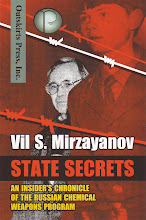Novichok’
Editorial of The New York Sun | September 9, 2013
It strains the English language to try to encapsulate just how cynical is the idea that Syria could squirm out of a military strike by giving up control of its arsenal of chemical weapons in a deal that includes — wait for it — Russia. The idea that Mr. al-Assad could dodge a war by giving up control of Syria’s weapons was floated by Secretary of State Kerry in what the New York Times called a “seemingly off-hand suggestion.” The Kremlin promptly jumped at the idea, and the White House, according to the Times, is now studying it.
To grasp just how cynical this is, try Googling the word “novichok.” The first entry turned up in our Google search was from Wikipedia, which reports that the word means “newcomer” and refers to a series of nerve agents developed by the Soviet Union in the 1970s and 1980s. They were, according to Wikipedia, “allegedly the most deadly nerve agents ever made.” We first started thinking about them in February 1996, when the Jewish Forward newspaper, which is based in New York and covers Russia, among other beats, ran a dispatch headlined “Russia Is Evading Agreement on Poison Gas, General Warns.”The dispatch, by James Ring Adams and Edward Schilling, reported on an interview Mr. Schilling conducted at Moscow with General Anatoly Kuntsevich, who had once been in charge of the Kremlin’s chemical weapons program. It was he who had reportedly set up the program to share chemical weapons with Syria. In 1996, in a desperate bid to avoid prosecution in post-Soviet Russia, Kuntsevich went public with a warning that a faction of the army and government was seeking to abandon treaty agreements to destroy the Russian chemical weapons program.
It was a chilling interview that was followed up by the Wall Street Journal’s editorial page, a major proponent of vigilance on proliferation of chemical, biological, and nuclear weapons. It ran a piece by Mr. Adams, warning that the “toxic threat” from Russia was not raising adequate alarm. The existence of a new generation of nerve gas weapons in and of itself had already been disclosed by several scientists in the Soviet Union’s chemical program. Dr. Vil Mirzayanov, Vladimir Uglev, and Andre Zheleznyakov went public in 1992, “in defiance of the government,” as the Forward put it.
Dr. Mirzayanov was put in the dock for treason in 1994, but the case was abandoned and Dr. Mirzayanov eventually moved to America, where as late as Desert Storm he told the Forward that the new Soviet gas was undetectable by Western defenses. Unlike other chemical weapons precursors, the Forward quoted him as saying, the components of the new agents could be disguised as products for peaceful use. The point was of concern to America and Israel. A year ago a German news magazine, Der Spiegel, reported that as late as the 1990s “the Russians were still stationing intelligence officers in the Golan Heights and in northern Syria.”
“The Israelis,” according to Spiegel, “were seething.” It reported that Kuntsevich’s life did not end until April 3, 2002, when, as Spiegel put it, the general, a “winner of the Lenin Prize” and “most recently” an employee at the Moscow-based Zelinsky Institute of Organic Chemistry, “died on a flight from Damascus to Moscow.” Reported Spiegel: “The circumstances of his death remain mysterious, along with the inscription on his headstone at the Troyekurovskoye Cemetery in western Moscow, where his date of death is marked as March 29.”
The Sun can’t vouch for the veracity of these reports, but neither have we any reason to doubt them. There is a long, sordid tale to be unraveled here. What the reports do underscore is that any settlement of the Syrian chemical weapons threat that involves a supposedly benign role by Russia would be a dodge of extraordinary cynicism, even for Secretary of State Kerry. Our instinct is that neither Syria nor Russia is going to permit these weapons to go under the control of America or Israel or another free, democratic, pro-western country. Let Congress be wary of any claims to the contrary.

No comments:
Post a Comment